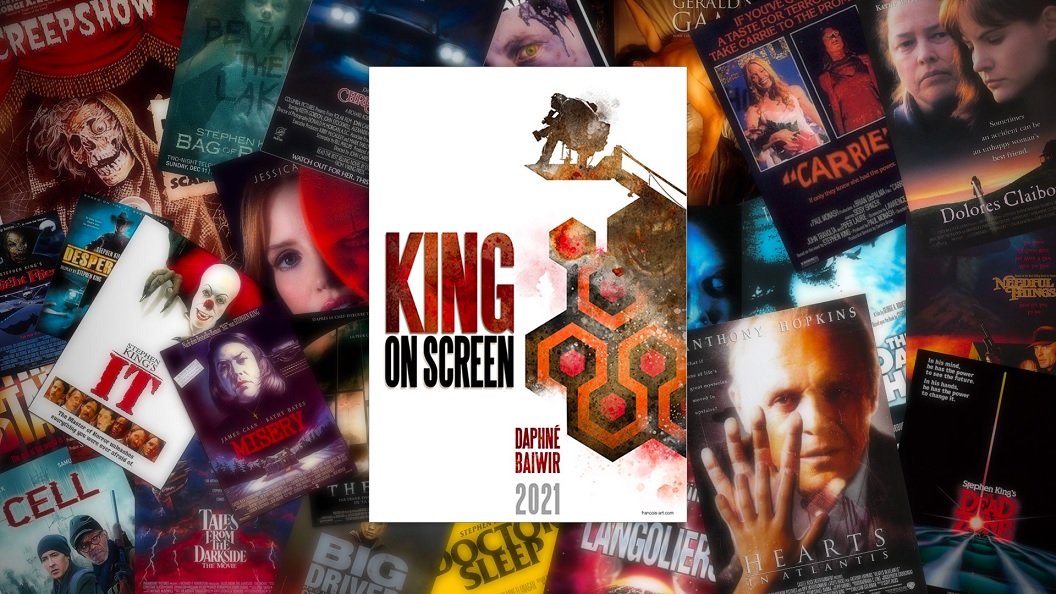'KING ON SCREEN' DIRECTOR DAPHNE BAIWIR HAS READ ALL THE BOOKS, WATCHED & REWATCHED ALL THE FILMS, TALKS ABOUT CHALLENGES OF ADAPTATION

"Whether you’re a book reader, a film watcher or a combination of the two, the odds are good that you’re familiar with Stephen King," begins an article by Kyle Milner at Moviehole. "The history of King adaptations is almost as long as the writer’s career: Brian De Palma’s Carrie hit the big screen in 1976, just a few years after the original novel’s publication. It set the bar high for any filmmaker looking to translate King’s dark and complex fictional worlds for cinema-going audiences, and while many have fallen short of De Palma’s classic, the duds are often as intriguing as the masterpieces in their own ways."
In the article, Milner interviews King On Screen director Daphné Baiwir, who discusses the challenges involved in adapting King's work for the screen:
As with many fans, Baiwir’s own exposure to Stephen King began at an early age. “I discovered Stephen King by reading “The Shining” for the first time when I was ten,” she recounts. “I’ve read absolutely everything he wrote; seen all the movies; because I started early. So I’ve had time to see everything.”Naturally, there are quite a few featurettes and documentaries about King’s books and the films based upon them to be found across DVD bonus discs and streaming services. But it goes without saying that there’s a lot of ground to cover; more than a lot of these features are able to touch upon.
“I saw a couple of documentaries about his work,” Baiwir explains, “but they were quite short. I wanted to know a little bit more, and I felt it could be interesting to have the directors’ point of view, because we don’t hear them a lot. It could be great to know a little bit more about what happens behind the scenes and how they managed to work with the author.”
With so many adaptations to date – more than eighty, across film and television – there are bound to be a mixture of masterpieces, decent attempts and some outright stinkers. So what exactly is central to the adaptations that do work?
“I think it depends on how the directors work,” Baiwir explains. “For example, we had the chance to meet Taylor Hackford (“Dolores Claiborne”) and he was telling us about working with the screenwriter. The screenwriter sometimes took a different direction in the process of writing the script, and it was interesting, because he did that to have a story that would translate well to the screen. It’s not always easy to do.”
Compromise is often the key to finding that balance between faithfulness to the original text and an effective cinematic experience, and Baiwir reflected on the risk of a certain spark being lost in the transition from page to screen. “I think about stories that Agatha Christie wrote that are so great when you read them; it’s something very special. But if you want to put it on the screen, it won’t have that same thing. You really have to adapt.”
One of the major subjects of the documentary is Frank Darabont, who helmed the acclaimed and award-winning King adaptations “The Shawshank Redemption,” “The Green Mile,” and “The Mist”. Darabont is arguably the most consistently successful filmmaker to adapt Stephen King’s work for the big screen.
After a very long and painful legal conflict with AMC over his involvement in their television series of “The Walking Dead” (for which he wrote, directed and produced in its early seasons,) Darabont hasn’t returned to Hollywood since departing 2016’s “The Huntsman: Winter’s War” during that film’s production. But it appears he was more than happy to discuss his past work with Baiwir.
“It was amazing, because he made three movies that are – to me – masterpieces. “The Green Mile” is my favorite, but “Shawshank” is amazing. “The Mist” is so great as well, with the ending that he came up with.” (The infamous ending, of course, that even King himself agreed was superior to that of the original short story.) “Talking with someone that is so passionate about cinema and movie-making, it’s like you are literally having a master class,” she laughs. “It was such an incredible experience.”
See also: Daphné Baiwir talks with Cherry the Geek TV



